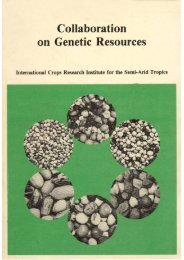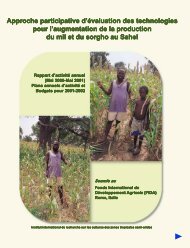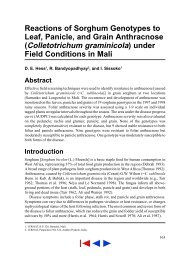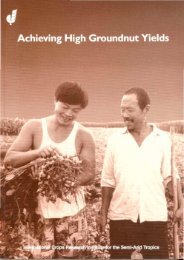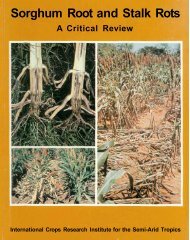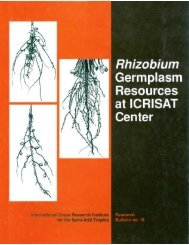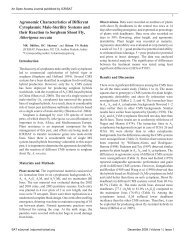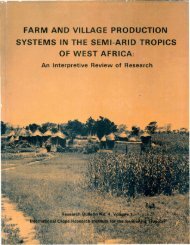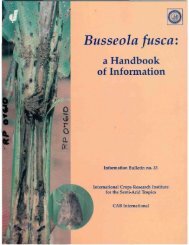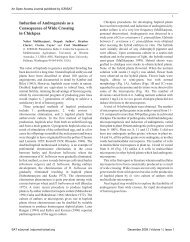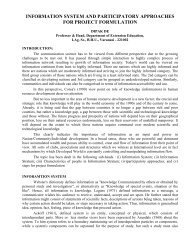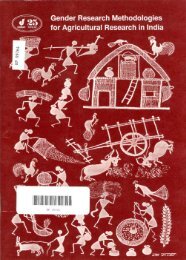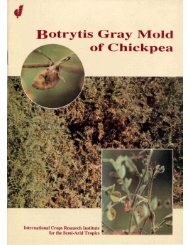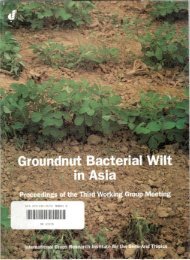RA 00183.pdf - OAR@ICRISAT
RA 00183.pdf - OAR@ICRISAT
RA 00183.pdf - OAR@ICRISAT
Create successful ePaper yourself
Turn your PDF publications into a flip-book with our unique Google optimized e-Paper software.
are not adapted to the short rainy seasons and lack resistance to diseases, insects, and<br />
droughts; yield losses due to infestation of weeds, insects, diseases, and nematodes; mycotoxin<br />
hazards to health due to fungal invasion of the groundnut; inadequate food supplies<br />
and lack of appropriate food technologies to exploit a relatively well adapted crop that is not<br />
generally considered a primary source of food; and resource management (agronomic,<br />
economic, and sociological) situations preventing efficient production and utilization.<br />
Countries, Institutions, and Research Programs in West Africa<br />
Senegal. Research is under way to develop cultivars that are disease and stress resistant<br />
and adapted to the short season environment. Management of aflatoxin through breeding for<br />
resistance, detection, and removal by adsorptive clays is another research action. Leadership<br />
is provided by Texas A&M University, the Senegalese Institute for Agricultural Research,<br />
and the Senegalese Institute of Food Technology.<br />
Burkina Faso. The cultivar improvement program in Senegal is linked to improvement<br />
efforts in Burkina Faso to infuse superior germplasm. Integrated Pest Management (IPM)<br />
research is solving problems caused by damage from insect pests. Food technology research<br />
is directed toward development of better use of groundnut as a primary food and its<br />
delivery to the population. Leadership is provided by Texas A&M University, the University of<br />
Georgia, Alabama A&M University, and the University of Ouagadougou, Burkina Faso.<br />
Mali. The cultivar improvement program in Senegal is linked to germplasm improvement in<br />
Mali, with leadership provided by Texas A&M University and the Institute for Economic<br />
Research, Mali.<br />
Niger. The cultivar improvement program in Senegal is linked to germplasm improvement<br />
in Niger with leadership provided by Texas A&M University and the Nigerien National Institute<br />
for Agricultural Research.<br />
Nigeria. Research to control rosette virus through development of resistant cultivars is led<br />
by the University of Georgia and Ahmadu Bello University, Institute of Agricultural Research<br />
with linkages to the cultivar improvement programs in Senegal and Burkina Faso.<br />
Networks. The research program is enhanced by networks involving the interaction or<br />
linkages between the collaborative centers; cooperation with the ICRISAT Sahelian Center in<br />
research planning, implementation, and workshops; and cooperative research support with<br />
IRHO in Senegal.<br />
In addition, support is provided in training to upgrade the skills of present researchers and<br />
provide graduate training to develop future researchers, purchase of expendable supplies<br />
and key items of research equipment, and communication of newly developed technology to<br />
farmers and to rural and urban consumers.<br />
51



